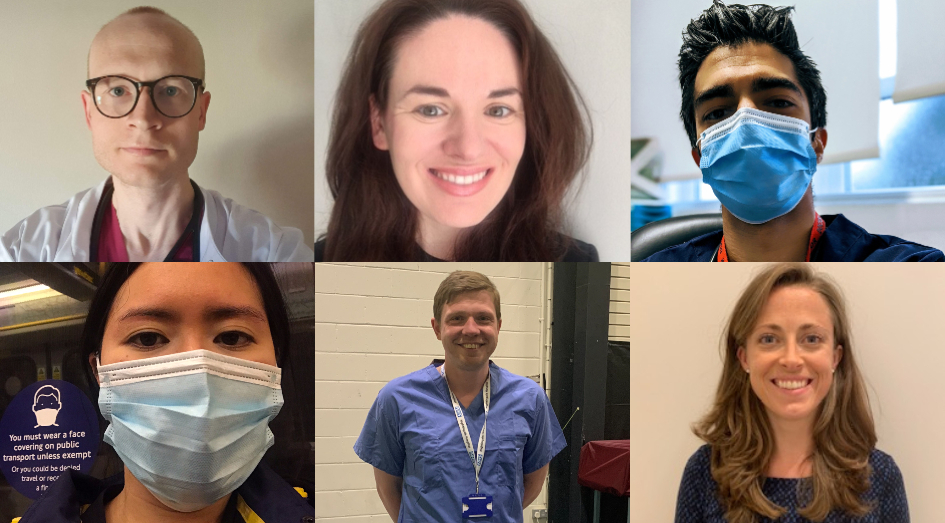
Nothing about 2020 has been normal. Perhaps some of us had what felt like a normal start to the year, but coronavirus has dominated headlines and headspace for all of us since then.
For research organisations like The Institute of Cancer Research, London, it has been an especially challenging time, with labs initially in freeze-frame, grants cut, and clinical trials placed on hold.
But our researchers didn’t stop – and indeed many of those with clinical backgrounds had a big part to play in the national effort against the pandemic. Many were redeployed back to NHS work related to COVID-19, putting themselves on the line to help where it was needed.
As we head into a second lockdown, our labs continue to stay open. Our clinical scientists will be ready and waiting to help if the call comes – in the meantime, here are their stories from earlier this year.
Matt Clarke
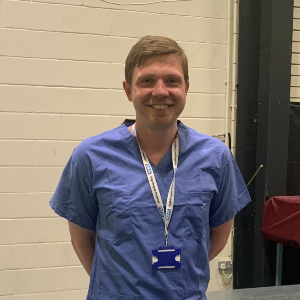 At the end of March, I was commencing the write-up of my thesis and working from home. I was however fully expecting to be asked to return to clinical practice and had already gained approval from my supervisor.
At the end of March, I was commencing the write-up of my thesis and working from home. I was however fully expecting to be asked to return to clinical practice and had already gained approval from my supervisor.
I was then contacted by Health Education England (HEE) to ask if I would be willing to suspend my research and return to clinical practice to help in the efforts against the pandemic. The next evening, I received a phone call to ask if I would be happy to start work at the NHS Nightingale London, and I said I would.
I was extremely worried about returning though, and particularly to the Nightingale. I am a histopathology trainee – I primarily diagnose and study diseases looking down a microscope – and therefore had not been on the wards directly treating patients since 2013
As a type 1 diabetic, I was increasingly aware of the mortality rates that were being reported in the press associated with people with diabetes; however, as a doctor I decided that I still wanted to do what I could to help.
On 31 March, I was sent to the Nightingale in ExCeL London for my training. I remember sitting in the training room with around 50 other healthcare professionals who I did not know, sitting on socially distanced chairs in what felt like a very tense atmosphere. There was a large screen at the front which was playing clips from various different celebrities thanking us for what we were about to do.
By chance, I bumped into a fellow pathologist and it was lovely to see a friendly face. He informed me that he might have a role for me which would be very useful to the hospital given my background as a histopathologist.
Later, he phoned me and appointed me as a deputy mortuary manager for the hospital. Many will think this is an awful position to have but it’s often forgotten that people who have died need looking after too. I was very proud to be a member of a team that were able to set up a fully functioning mortuary from scratch within a couple of weeks.
Unfortunately, I contracted the virus. I was tested on my way back through the hospital on a Sunday evening despite showing no symptoms. I had to go into self-isolation at the hotel I was staying in next to the hospital.
As a diabetic, I was very worried about what was going to happen. But thankfully, I remained asymptomatic and was extremely well looked after by the hotel staff and my colleagues at the hospital who checked on me daily and brought food deliveries to my door.
It makes you feel very proud to be part of a medical and scientific community who step up to the plate in very challenging circumstances to do their bit to help others.
Ben O’Leary
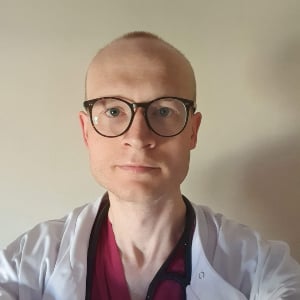 To prepare for the first wave of COVID-19 The Royal Marsden put together a dedicated acute team of oncology doctors to manage all of the cancer inpatient issues and emergencies – I joined this in April. I had contracted COVID-19 a week or two earlier, around the same time as Boris Johnson. I was pretty sick, but luckily didn't need to go to hospital.
To prepare for the first wave of COVID-19 The Royal Marsden put together a dedicated acute team of oncology doctors to manage all of the cancer inpatient issues and emergencies – I joined this in April. I had contracted COVID-19 a week or two earlier, around the same time as Boris Johnson. I was pretty sick, but luckily didn't need to go to hospital.
There was a lot of uncertainty around how best to look after people with coronavirus and minimise the risk to staff and other patients, so we had to learn as we went along. A real positive was the collaborative team spirit among all the staff, and the many kind, supportive efforts from people and organisations outside the hospital.
It was and is a big problem for my research work. A number of funding applications I had in progress were effectively cancelled, rolled over or put indefinitely on hold. Funding cuts could have huge implications across cancer research.
Clinical studies could not recruit patients and although this is up and running again for many it may be constrained by future lockdowns. For a while the lab space was almost entirely closed and we're still in the process of working out the best way forward now.
Amit Sud
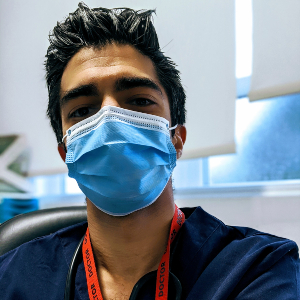 I started my Academic Clinical Lectureship at the ICR and The Royal Marsden in March 2020. As the first peak was emerging, the South West London Haematology Training Programme Director was aware that hospitals were likely to need additional medical staff to assist. Haematology doctors currently undertaking research in southwest London were distributed across relevant hospitals.
I started my Academic Clinical Lectureship at the ICR and The Royal Marsden in March 2020. As the first peak was emerging, the South West London Haematology Training Programme Director was aware that hospitals were likely to need additional medical staff to assist. Haematology doctors currently undertaking research in southwest London were distributed across relevant hospitals.
I had just left Epsom and St Helier Hospital where I had an enjoyable and rewarding experience as well as a good relationship with colleagues there – it made sense for me to return there. During my redeployment, I worked on a project led by Professor Clare Turnbull to model the potential impact of the pandemic on cancer survival in the UK.
I was worried about patients at risk of significant morbidity and mortality associated with COVID-19, the disruption to healthcare services and the impact of such changes on patients and their relatives, and the health and wellbeing of other healthcare professionals, family and friends.
That said, I was given hope by the patience and resilience of our patients and the dedication, hard work and kindness shown by many.
Whilst scientific resources have been directed towards understanding the SARS-CoV-2 virus and COVID-19, research in other domains must continue. The pandemic has shown that we can collaborate and adapt to a dynamic environment. However, we face many challenges to ensure scientific working practices continue safely and effectively.
Holly Ní Raghallaigh
I am a urology registrar in my ‘normal life’ and was taking time out for out-of-programme research to work at the ICR with Professor Ros Eeles. As part of my time with her Oncogenetics team, I was involved with her translational/clinical studies so I spent a lot of my time with the urology team.
Once COVID-19 arrived and they needed some more support, it made sense for me to join their team, especially given my clinical background. I was supposed to be seconded elsewhere but I requested to stay and help The Royal Marsden.
I don’t really believe we deserve extra thanks or praise; we were just doing our job and adapting to a specific scenario as best we could, which is sort of what you do in surgery and medicine a lot anyway. It was incredibly frustrating not giving patients recovering from major surgery the chance to see friends and family. That upset me a lot.
It was a very rewarding, interesting and professionally important time during my period at the ICR, mainly because I got to work so closely with not just the urology team at The Royal Marsden, but also with the teams in the Cromwell Hospital who worked so hard to really transform their model of care and day-to-day activities to support the NHS. I am in awe of the amount of time and effort it must have taken to set up and maintain the Cancer Hub activity.
Maria Coakley
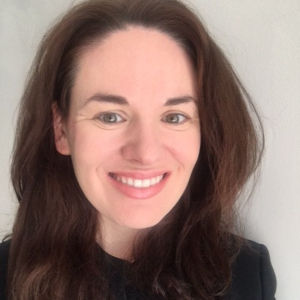 Knowing that more doctors would be needed, I volunteered to re-join the clinical team in The Royal Marsden, where I was placed with the medical oncology breast team. Fortunately this was a good fit, as my research at the ICR is in breast cancer. I worked with patients who had breast cancer who were still undergoing treatment during this time. This was, and continues to be, a very stressful time for patients and their families as the risk of Covid-19 needs to be very carefully balanced against the risk of their cancer progression without treatment.
Knowing that more doctors would be needed, I volunteered to re-join the clinical team in The Royal Marsden, where I was placed with the medical oncology breast team. Fortunately this was a good fit, as my research at the ICR is in breast cancer. I worked with patients who had breast cancer who were still undergoing treatment during this time. This was, and continues to be, a very stressful time for patients and their families as the risk of Covid-19 needs to be very carefully balanced against the risk of their cancer progression without treatment.
Working with a wonderful, dynamic team in The Royal Marsden was very inspiring as staff across all departments did their utmost to continue to deliver exceptional patient care during this difficult time.
Cancer and COVID-19 have many similarities. For both to be defeated we need rapid, highly sensitive and specific diagnostic tools to reliably detect disease as quickly as possible, and for both we need improved treatments to help the most ill. I return to my scientific work with renewed insight into how important it is to continuously drive improvements in the diagnostic and treatment paradigms for patients with serious and incurable illnesses.
Emily Goode
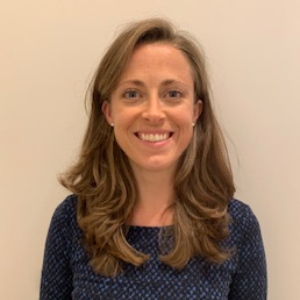 As the case numbers in London increased and staff illness impacted the hospital's workforce, registrars currently undertaking research were contacted to return to help with frontline work. Since most of the ICR’s labs had to close and my experiments had had to stop, I willingly returned to the NHS.
As the case numbers in London increased and staff illness impacted the hospital's workforce, registrars currently undertaking research were contacted to return to help with frontline work. Since most of the ICR’s labs had to close and my experiments had had to stop, I willingly returned to the NHS.
After a couple of years out of clinical work doing research in a wet lab, it was a challenging time to return to clinical practice and night shifts! There were of course worries that there had been a lot of staff sickness in the NHS, issues around personal protective equipment and access to testing nationally.
Though I did not want to bring the virus home, I would much rather be at work helping than watching from home. I felt very grateful to be able to go to work and to be looking after patients again. I think lockdown working at home, powerless to make a difference, would have been challenging for me.
Clinical trials were set up very quickly and hopefully will help to answer the questions around COVID-19 and cancer/cancer treatments. The pace of clinical trial grants being written, approved, set up and recruiting patients was impressive and hopefully something we can reflect on for future cancer clinical trials and translational research.
The interruption to return to clinical practice has made me grateful for my time in research. At a time when charity finances are stretched I also feel very fortunate to have Cancer Research UK funding for my PhD.
Charleen Chan
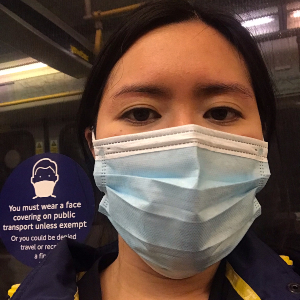 I'm a clinical oncology registrar and had started my Academic Clinical Fellowship block in March 2020 in the immunotherapy-focused lab run by Professors Alan Melcher and Kevin Harrington. After four weeks in the lab, I was redeployed back to clinical work at The Royal Marsden. I was mainly worried about bringing the virus home to my friends and family.
I'm a clinical oncology registrar and had started my Academic Clinical Fellowship block in March 2020 in the immunotherapy-focused lab run by Professors Alan Melcher and Kevin Harrington. After four weeks in the lab, I was redeployed back to clinical work at The Royal Marsden. I was mainly worried about bringing the virus home to my friends and family.
The immense response to the call to redeployment back to clinical work from clinical academics, retired doctors and nurses gave us all such hope. We were well staffed at The Royal Marsden due to this. The members of public being supportive and also companies that would deliver food and supplies during our shifts really helped to boost morale.
This experience has definitely shown me how science can be impacted by the global climate. Researchers in the lab have continued to collaborate in difficult and unusual circumstances which has really shown how resilient scientists are and that innovation does not stop in the face of crisis.
comments powered by